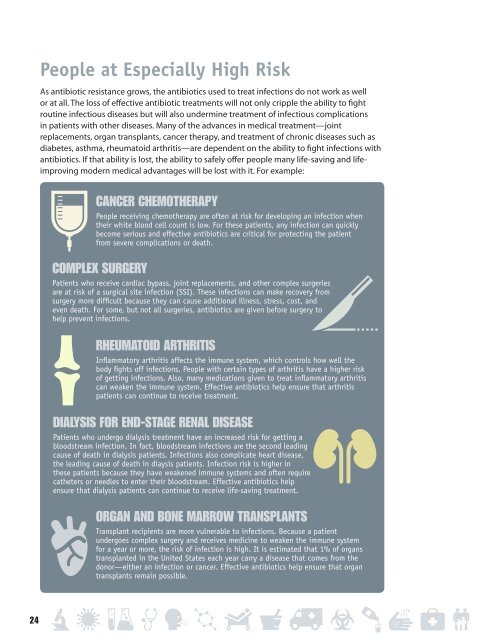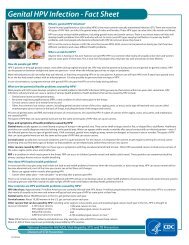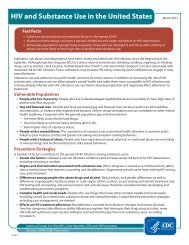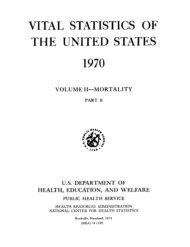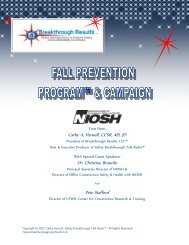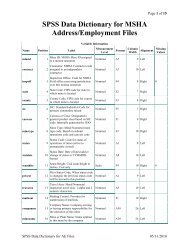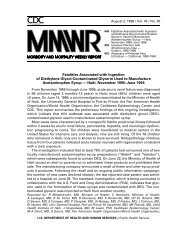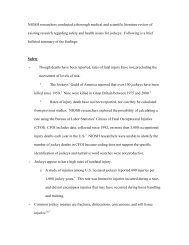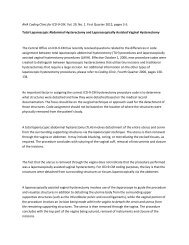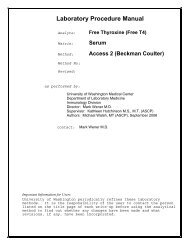Antibiotic Resistance Threats in the United States, 2013 report
Antibiotic Resistance Threats in the United States, 2013 report
Antibiotic Resistance Threats in the United States, 2013 report
You also want an ePaper? Increase the reach of your titles
YUMPU automatically turns print PDFs into web optimized ePapers that Google loves.
People at Especially High Risk<br />
As antibiotic resistance grows, <strong>the</strong> antibiotics used to treat <strong>in</strong>fections do not work as well<br />
or at all. The loss of effective antibiotic treatments will not only cripple <strong>the</strong> ability to fight<br />
rout<strong>in</strong>e <strong>in</strong>fectious diseases but will also underm<strong>in</strong>e treatment of <strong>in</strong>fectious complications<br />
<strong>in</strong> patients with o<strong>the</strong>r diseases. Many of <strong>the</strong> advances <strong>in</strong> medical treatment—jo<strong>in</strong>t<br />
replacements, organ transplants, cancer <strong>the</strong>rapy, and treatment of chronic diseases such as<br />
diabetes, asthma, rheumatoid arthritis—are dependent on <strong>the</strong> ability to fight <strong>in</strong>fections with<br />
antibiotics. If that ability is lost, <strong>the</strong> ability to safely offer people many life-sav<strong>in</strong>g and lifeimprov<strong>in</strong>g<br />
modern medical advantages will be lost with it. For example:<br />
CANCER CHEMOTHERAPY<br />
People receiv<strong>in</strong>g chemo<strong>the</strong>rapy are often at risk for develop<strong>in</strong>g an <strong>in</strong>fection when<br />
<strong>the</strong>ir white blood cell count is low. For <strong>the</strong>se patients, any <strong>in</strong>fection can quickly<br />
become serious and effective antibiotics are critical for protect<strong>in</strong>g <strong>the</strong> patient<br />
from severe complications or death.<br />
COMPLEX SURGERY<br />
Patients who receive cardiac bypass, jo<strong>in</strong>t replacements, and o<strong>the</strong>r complex surgeries<br />
are at risk of a surgical site <strong>in</strong>fection (SSI). These <strong>in</strong>fections can make recovery from<br />
surgery more difficult because <strong>the</strong>y can cause additional illness, stress, cost, and<br />
even death. For some, but not all surgeries, antibiotics are given before surgery to<br />
help prevent <strong>in</strong>fections.<br />
RHEUMATOID ARTHRITIS<br />
Inflammatory arthritis affects <strong>the</strong> immune system, which controls how well <strong>the</strong><br />
body fights off <strong>in</strong>fections. People with certa<strong>in</strong> types of arthritis have a higher risk<br />
of gett<strong>in</strong>g <strong>in</strong>fections. Also, many medications given to treat <strong>in</strong>flammatory arthritis<br />
can weaken <strong>the</strong> immune system. Effective antibiotics help ensure that arthritis<br />
patients can cont<strong>in</strong>ue to receive treatment.<br />
DIALYSIS FOR END-STAGE RENAL DISEASE<br />
Patients who undergo dialysis treatment have an <strong>in</strong>creased risk for gett<strong>in</strong>g a<br />
bloodstream <strong>in</strong>fection. In fact, bloodstream <strong>in</strong>fections are <strong>the</strong> second lead<strong>in</strong>g<br />
cause of death <strong>in</strong> dialysis patients. Infections also complicate heart disease,<br />
<strong>the</strong> lead<strong>in</strong>g cause of death <strong>in</strong> diaysis patients. Infection risk is higher <strong>in</strong><br />
<strong>the</strong>se patients because <strong>the</strong>y have weakened immune systems and often require<br />
ca<strong>the</strong>ters or needles to enter <strong>the</strong>ir bloodstream. Effective antibiotics help<br />
ensure that dialysis patients can cont<strong>in</strong>ue to receive life-sav<strong>in</strong>g treatment.<br />
ORGAN AND BONE MARROW TRANSPLANTS<br />
Transplant recipients are more vulnerable to <strong>in</strong>fections. Because a patient<br />
undergoes complex surgery and receives medic<strong>in</strong>e to weaken <strong>the</strong> immune system<br />
for a year or more, <strong>the</strong> risk of <strong>in</strong>fection is high. It is estimated that 1% of organs<br />
transplanted <strong>in</strong> <strong>the</strong> <strong>United</strong> <strong>States</strong> each year carry a disease that comes from <strong>the</strong><br />
donor—ei<strong>the</strong>r an <strong>in</strong>fection or cancer. Effective antibiotics help ensure that organ<br />
transplants rema<strong>in</strong> possible.<br />
24


